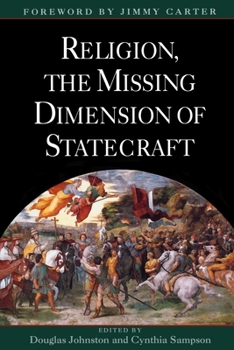Religion, the Missing Dimension of Statecraft
Select Format
Select Condition 
Book Overview
As the Cold War era becomes history, we are entering an age when international conflict is increasingly based on racial, ethnic, national, and religious clashes--the most intractable sources of conflict, and those with which conventional diplomacy is least suited to deal. The particularly American tendency to separate political from spiritual life often tends to ignore a vital aspect of international relations--one that can be a powerful tool in negotiations. Religion plays a crucial role in many international conflicts, yet for the most part, diplomacy either ignores or misunderstands its role. This unified collection of case studies and theoretical pieces attempts to restore this missing dimension to its rightful place in the conduct of international diplomacy. Sponsored by the Center for Strategic and International Studies in Washington, D.C., this study offers the first systematic account of modern cases in which religious or spiritual factors have played a helpful role in preventing or resolving conflict and achieving non-violent socio-political change. Written by a distinguished roster of scholars, the cases presented span the globe, with examples from Europe, Central America, Asia, and Africa. Additional essays summarize the findings of these case studies to bring out their implications for foreign policy and the religious community. In the Foreword, former President Jimmy Carter states that the book "poses a challenge to diplomats and politicians, religious figures and laypersons, analysts and academics alike." Conceived to help call attention to and reinforce the positive contribution that religious and spiritual influences can bring to peacemaking, this important study offers practical guidelines for the future application of this kind of peacemaking in existing and incipient conflict situations.
Format:Paperback
Language:English
ISBN:0195102800
ISBN13:9780195102802
Release Date:October 1995
Publisher:Oxford University Press
Length:368 Pages
Weight:1.23 lbs.
Dimensions:1.0" x 6.1" x 9.2"
Customer Reviews
2 ratings
Re-opening an Old Dimension: Quietly Please.
Published by Thriftbooks.com User , 16 years ago
Question: How might religion and spirituality play a positive role in the work of diplomacy? When a friend in Washington, D.C. recommended I read Religion, The Missing Dimension of Statecraft, I hesitated. I shouldn't have waited. This book is a series of theoretical chapters and case studies, which illuminate the effect of a sacred-secular dichotomy in public life and religious life in the United States. It shows how American diplomats have been unwilling or unable to understand the influence of religion in peace-making the past several decades. Douglas Johnston shows how the role of religion in peacemaking is mostly unnoticed because religious mediators typically avoid attention from the media. Conflict resolution is chronicled in post WWII France and Germany, Nicaragua in the mid-1980s, Nigeria in the Biafran civil war, East Germany's peaceful transition from communism, South Africa's journey to the end of apartheid, and more. These case study chapters show how, in each of these conflicts, there were faithful Christian leaders serving as peacemakers. These mediators paid close attention to the role of religion in the peace negotiations. Finally, after surveying the track record of the US foreign policy establishment's attention to spirituality, a few chapters explore the implications of the case studies. For today's Christian leader, this book is a useful resource to seriously examine the challenges faced in envisioning how we might partner with political leaders to realize the fuller potential of peacemaking. However, this kind of diplomacy must not become publicized. It's best left to the quiet negotiators, the true peace-makers.
Shows Christianity at work not reported by press.
Published by Thriftbooks.com User , 25 years ago
Many examples of Christians working, such as in Eastern Germany just after the wall came down. Very surprising. These are instances not reported by the press of actions for which the Christians sought to avoid media attention.






